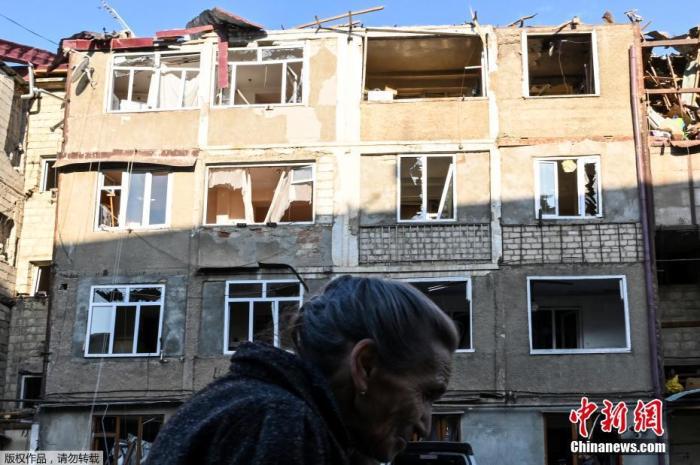China News Service, October 5th, a comprehensive report, on the 4th local time, Armenia and Azerbaijan entered the eighth day of military conflict in the Nagorno-Karabakh (Naka) area.
Fierce exchanges of fire took place that day, and the fighting gradually heated up. So far, at least 240 people have been killed and local civilians have been affected.
Stepanakert, a major city in the Naka region, was affected by the firefight, and residential houses were damaged.
The picture shows residents gathered in front of the damaged building.
Nearly 40 civilians died
The regional capital was shelled again
Armenia and Azerbaijan began a new round of conflict in the Naka region on September 27.
In recent days, the war has continued to spread, and Asia and Afghanistan have mutually controlled each other's attacks on civilian areas.
Authorities on both sides reported that since the outbreak of the conflict, more than 240 people have died, including nearly 40 civilians.
On October 4, Stepanakert, the capital of the Naka region, was shelled again.
A Russian Satellite News Agency reporter reported on the scene that two explosions were heard in Stepanakert, and then air defense alarms sounded.
Prior to this, communications in the city were interrupted, and there was a power outage, and citizens hid in basements.
The Azerbaijani authorities stated that Armenia took "retaliatory measures" after launching rockets from Stepanakert to towns in the Fuzul region.
On the same day, Azerbaijan stated that Ganja, the second largest city in its territory, was shelled by the Armenian armed forces and that “civilians, civilian infrastructure and ancient historical buildings were injured.”
According to reports, Ganja is the second largest city in Afghanistan with a population of over 330,000.
A local resident said: "We heard a huge explosion. It was shocking and terrifying." "We left the apartment and went to a shelter." Alfonian also said that Armenian artillery attacked their 19 villages overnight.
However, the Armenian government denied the allegations of firing on Azerbaijan.
The ICRC condemned the indiscriminate shelling by the forces of both sides, which violated international law.
The organization urges all parties to take "all feasible measures" to protect civilians and civilian infrastructure, "this is an obligation under international humanitarian law."
Stepanakert, a major city in the Naka region, was affected by the firefight, and residential houses were damaged.
The picture shows the damaged residential houses.
Asia and Afghanistan are deadlocked
Call for a ceasefire
The Asian-African conflict continues to ferment, affecting civilians.
On the 4th, Russian Foreign Minister Lavrov had a phone call with Armenian Foreign Minister Mnatsa Kanyan.
Moscow is concerned about the increase in civilian deaths and pointed out that a ceasefire must be made as soon as possible.
However, President Aliyev said in a speech on the 4th that there is only one condition for a ceasefire, "The (Armenian) armed forces must leave our territory."
The day before, Armenian Prime Minister Pashinyan also delivered a national speech, calling for unity among the people.
He said: "In our thousand-year history, we may be facing the most decisive moment."
The Naka region is located in the southwest of Azerbaijan, and its residents are mostly Armenians.
After the disintegration of the Soviet Union, Armenia and Azerbaijan broke out to fight for the Naka region. Armenia occupied the Naka region and the surrounding part of Azerbaijan's territory.
Although the two sides reached a comprehensive ceasefire agreement in 1994, the Innaqa issue has always been in a state of hostility and military conflicts have occurred from time to time.
On September 27, Aya broke out in a large-scale armed conflict in the Naqa region, with casualties of both soldiers and civilians.
The two countries accuse each other of breaking the ceasefire agreement while continuing to declare a hardline stand.
Pashnyan and Aliyev successively declared that the country had entered a wartime state and carried out general military mobilization.
After the conflict, Turkey and Pakistan clearly expressed their support for Afghanistan, and Russia, the United States, France, Germany, the European Union, and the United Nations have all expressed their concerns about the armed conflict in Aya and called for an immediate ceasefire to avoid further escalation and support. The OSCE Minsk Group plays a role.

